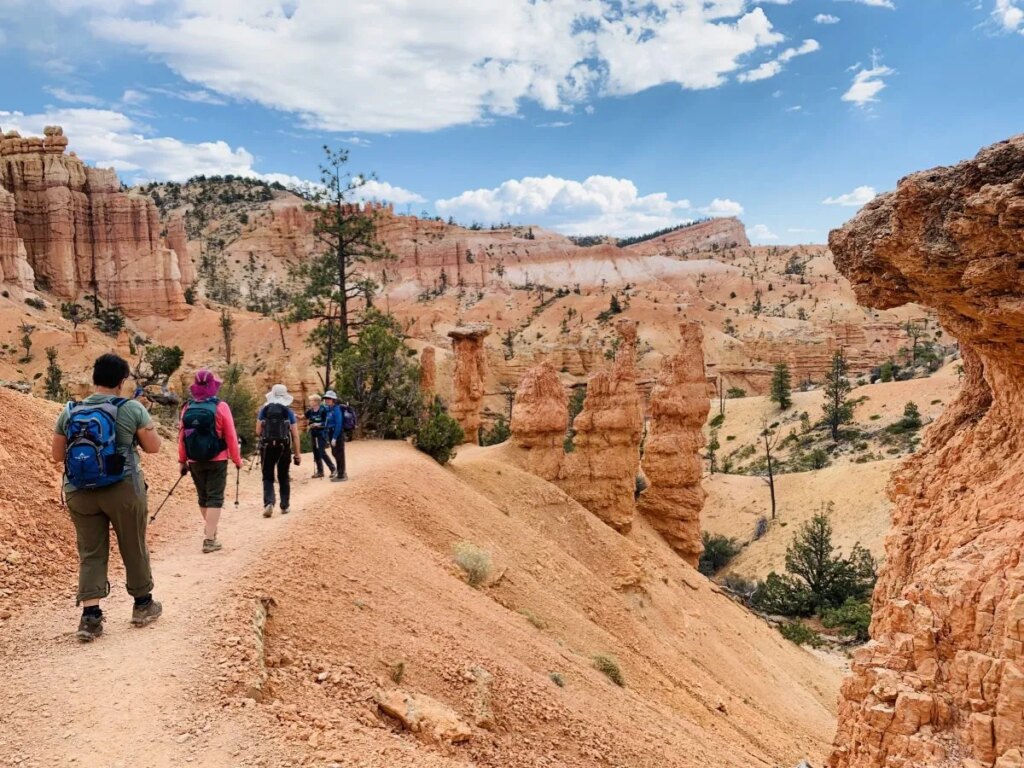
America’s Rocky Mountains, thriving national parks, and more than 12,000 miles of coastline have lost some of their shine for adventure travelers, who are now taking their dollars elsewhere amid shifting political landscapes, international tariffs, and uncertainty over border policies.
“There’s been a noticeable decline in interest from foreign visitors to the U.S., many of whom now perceive the destination as less welcoming or harder to access,” said Heather Kelly, director of research at the Adventure Travel Trade Association (ATTA).
Preliminary results from an upcoming ATTA survey of over 100 tour operators and advisors reveal how this shift in traveler preferences is impacting business. Approximately 95% of adventure travel businesses said they anticipate a negative effect on revenue within the next six to 12 months, and as many as 80% of those surveyed have already experienced a decline.
These findings align with recent data showing a decrease in international travel to the U.S. In March, the number of travelers from Canada to the U.S. dropped by nearly 900,000 from the same month last year, according to US Customs and Border Protection. The number of European travelers was down 12%.
Border Concerns Drive Canceled Adventures
Despite adventure travelers’ typical willingness to embrace risks, concerns about U.S. entry and re-entry policies are proving to be a significant deterrent.
“I’ve had several clients cancel trips this year because they’re worried about getting in and out of the country,” said Kelly Kimple, chief executive of U.S.-based travel operator Adventures in Good Company. “We had two women cancel their upcoming trip to Ireland, citing concerns about their ability to safely re-enter the U.S. as members of the LGBTQ community. Another traveler, booked on a trek to Machu Picchu with us, shared that her attorney advised her not to leave the country at this time. She’s a green card holder from Malaysia.”
For Keri Montgomery, co-owner of Vancouver-based adventure tour operator Finisterra Travel, the trend is clear. “Reports of Canadians being detained at the border and having their phones searched have made people more wary. The sense of ease and freedom that once came with crossing into the U.S. simply isn’t there anymore.”
Tariffs Deter Travelers
Tariffs imposed by the Trump administration are also discouraging travelers from visiting.
“We were having our busiest start to the year on record,” said Montgomery, “but almost as soon as the tariff threats began, bookings dropped off.” She believes some Canadian adventure travelers are avoiding the U.S. as a protest against the economic uncertainty caused by Trump’s levies.
For Ross Veitch, CEO of Singapore-based travel company Wego, the decline also stems from the rising cost of U.S. travel. “Cities in the U.S. were already very expensive for many international visitors, and increased tariffs will make this even worse. Combined with anti-foreigner rhetoric in the media and stories about discrimination at the borders, the country’s appeal is suffering,” said Veitch.
Fear of New Travel Bans
Ongoing concerns about potential new travel bans, reminiscent of Trump’s 2017 restrictions on travelers from several Muslim-majority nations, are further dampening tourists’ interest.
In the UAE, a Muslim-majority country with strong U.S. relations, travelers remain cautious. Abhishek Dadlani, founder of UAE luxury experience company Lushescapes Dubai, has noticed “a quiet undercurrent of caution among some GCC travelers” when planning trips to the States. As a result, alternative destinations are gaining popularity.
“We’re seeing renewed interest in places like Japan, Australia, New Zealand, the Schengen states, the UK, Brazil, Argentina, and even parts of Southeast Asia this year,” says Dadlani.
No More Warm Welcomes
The perception of the U.S. as a less welcoming destination is affecting both inbound and outbound travel. Nancy De Losa, co-founder of Italian cycling tour operator A’qto, reports that a U.S.-based client recently withdrew from an upcoming biking tour in Puglia due to concerns about not being welcome in Europe. Similarly, Rogier Van Oorscho, CEO of Norway Adventure, notes a decline in U.S. bookings, with clients expressing “a general feeling of insecurity” about overseas travel.
Anna, a 27-year-old American from Kansas City honeymooning in Europe, experienced this unease firsthand after misinterpreting new UK travel requirements that mandate visa-exempt travelers to complete an ETA, as a reflection of the political climate.
“We don’t like it any more than people in Europe or other countries do. We’re really trying to make sure we aren’t seen as just the dumb Americans,” she told Skift.
Not all adventure travel sectors are equally impacted. Matthew Kearns of luxury adventure tourism company Tribal Tourist notes that high-end safaris, at least for the moment, remain stable. “For luxury safaris in Africa, it seems to be business as usual, likely because these are bucket-list trips, often planned years in advance,” he explains.
Doni Belau, founder and chief executive of Girls Guide to the World, a U.S.-based women-only adventure travel company, notes no slowdown in bookings this year. “If anything, more people from the U.S. are joining our tours lately. From what I’ve observed, it feels like more and more women are using travel as an escape from the stress, division, and constant drama back home.” She did note that some travelers were expressing concerns about how they might be perceived overseas, revealing “There’s definitely a fear of being met with disdain or judgment.”
Adapting to a New Landscape of Adventure Travel
For affected businesses, adaptability is key. “We’ve started offering unique experiences within Canada,” says Montgomery. “My only advice to others facing similar challenges is to be flexible in your offerings.”
Kimple agrees, advising business owners to assess each situation individually. “We’re doing what we can to support our travelers. When non-refundable payments have already been made to partners, we convert them into credits for domestic alternatives.”
The ATTA is calling for broader industry action. “Current government trade and border policies are creating instability,” says chief executive Shannon Stowell. The association has since formed the Beyond Borders Tourism Coalition, a collaborative initiative designed to support US-Canada tourism during these challenging times.
Premium IPTV Experience with line4k
Experience the ultimate entertainment with our premium IPTV service. Watch your favorite channels, movies, and sports events in stunning 4K quality. Enjoy seamless streaming with zero buffering and access to over 10,000+ channels worldwide.

















